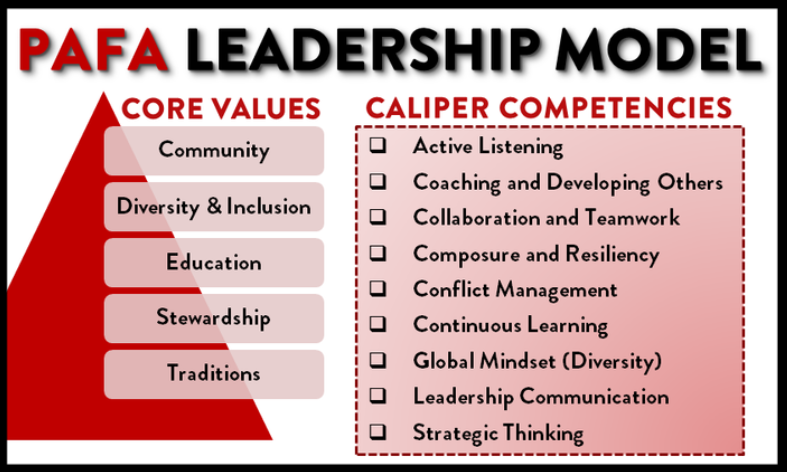
Dyani White Hawk (b. 1976), She Gives (Quiet Strength VII), 2020, Acrylic on canvas, Museum Purchase, 2020.17.
Leadership Effectiveness Initiative.
LEADING AT ALL LEVELS
“Leadership is the capacity to translate vision into reality.”
― Warren Bennis
WE aim to model transparent and inclusive leadership by ensuring PAFA leaders have the resources and support they need to create a climate of equity and a sense of belonging.
Organizational leadership is central to internal alignment and demonstrating humility and responsibility toward our community members, which enriches our climate.
The OISE team created a Leadership Effectiveness Initiative to define the competencies needed for inclusive leadership at PAFA and to drive change that fosters a culture of accountability alongside diversity, equity, inclusion, and belonging, a leadership model was identified.
The PAFA Leadership Model has nine values-based competencies to support the core values and is threaded in all human resources practices.
PAFA Leadership Model.
“To be authentic is literally to be your own author, to discover your own native energies and desires, and then to find your own way of acting on them.”― Warren G. Bennis.
Focusing on leadership effectiveness was a key recommendation from BELONGING, PAFA’s DEIB Committee. As part of the process to define a leadership model for PAFA, we gathered data from the Senior Staff, the Supervisors Forum, and all staff from January to March 2021. The collective and aggregate data from the assessments below were presented to the Supervisors Forum which informed the PAFA Leadership Model presented to all staff on March 5, 2021.
The Caliper Profile is an objective assessment that accurately measures an individual’s personality characteristics and motivations. Scientifically validated by nearly 6 decades of research, the Caliper Profile is the gold standard of personality assessment and measures 22 robust traits that can be utilized to predict behavioral and competency alignment across profit and non-profit organizations, including cultural and educational institutions. The Caliper Profile assessment data can be utilized throughout the employee lifecycle including selection, development, promotion, team building, and succession planning.
Through the ICCA assessment, we can identify 6 core behaviors that are critical to developing our intercultural competence: Empathy, Relationship Building, Open-Mindedness, Resilience, Flexibility, and Orientation Towards Learning. Intercultural competence is an individual’s capacity to work fairly and respectfully with all types of people regardless of how similar or different they are from them. By demonstrating these behaviors more regularly, we will be better placed to work with others more effectively and be able to learn from others who are different from us.

